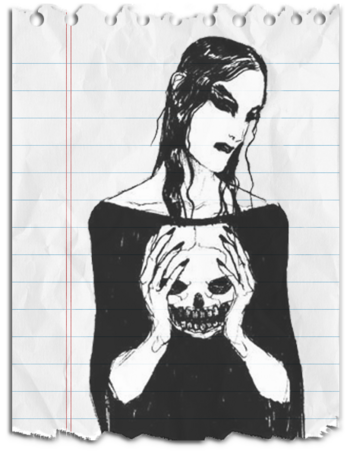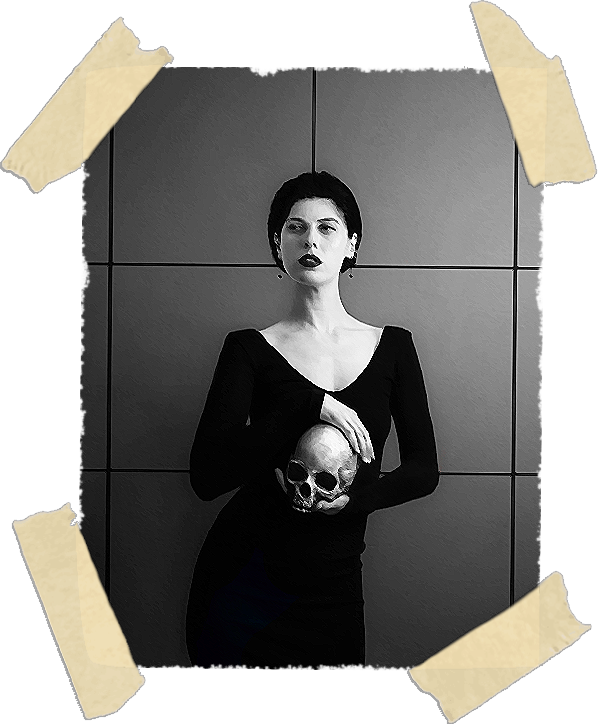Hecata
Jump to navigation Jump to search
WHO ARE THE HECATA?
Clan of Death | Graverobbers | The Family | Stiffs | Lazarenes
Hecata sires favor mortals either from their own mortal families, or who provide links to outside families from whom the Hecata would benefit. They prefer kine of a morbid, black-humored, or pragmatic bent, due to the clan’s death-dealing nature. They have little need for the compassionate or empathetic, unless it serves to satisfy a gap the clan — which in many ways is structured like an expanding corporation as much as it is a family — requires filled.
The Hecata Embrace those who show a resolute willingness to do what needs to be done, for the good of the family, their block, their community, or their society, ahead of their own interests. The family must always come first, whether or not your surname is Giovanni. There are no other “independents” these nights, so it’s the Hecata versus everybody else. The Necromancers describe their Embrace tradition as “gifting the truly exceptional with membership in the most exclusive of households.” Spontaneous Embraces are very much frowned upon by the wider clan, the members of which favor the ritualistic approach of observing, grooming, and voting on which mortals deserve immortality.
Kingpins, self-starters, individuals who have faced or dealt death, and those with medical or occult knowledge all appeal to the Hecata. Anyone with a true, scientific interest in death, the afterlife, and religion stands a chance of being approached for the Embrace, though academic theologians are more likely recipients of the bite than the blindly faithful. Many become vampires dedicated to serving the family, expanding its interests, and researching new mysteries associated with the cycle of life and death. Different fledglings set to work handling the living, the dying, the dead, and the rotting, in the form of nurses and carers, morticians, and of course necromancers. Each adds something to the clan.
The Hecata look for many childer among miscreants of all kinds. Though they do not control any widespread mortal crime empires, the clan appreciates the practiced killer, the cold-blooded money launderer, and the charming con artist. Their roles continue on once they receive the Embrace, complementing the clan’s legitimate businesses — investment banks, trading conglomerates, and private hospitals and care facilities — with a steady flow of illicit cash and bodies.
DISCIPLINES
Auspex: The power to receive visions of fate’s intentions and speak without moving one’s lips. The Hecata believe fate has grand plans for their clan, and they do so enjoy meddling in the fates of others. They might predict a mortal’s death and prevent it, or they might hasten someone’s departure. The Hecata use Auspex to plan their moves — for this clan is cautious, and rarely strikes on impulse — and to catch glimpses of the restless dead, enabling the dread arts for which the clan is known.
Fortitude: The ability to resist blows, bullets and fire. The Hecata believe they are closer to death than any other clan, and the way in which they manifest this Discipline may lend credence to that claim. They absorb injuries as a corpse might, without feeling or consideration. As fists and blades rain down on them, the Necromancers shrug off such harm, inexorably approaching their target. Their minds are likewise resistant to meddling, detached in a sense from mortal fragility.
Oblivion: The ability to commune with, manipulate, and control the energies of death and the dead. This power is among the most mysterious of Disciplines, as it reaches into the occult territory of the afterlife. Through its use, the Hecata might interrogate a spectre or set it to attack a rival. They might rot a mortal’s flesh with a touch or practice a foul ceremony designed to drive a meddling kine to their just reward. Oblivion stains the user’s soul, but the Hecata see it as a necessary evil for understanding the mysteries of life, death, and undeath.
BANE
Steeped in death, the fangs of the Hecata bring not bliss, but agony. Victims caught unawares will violently resist unless restrained, and few people submit willingly to the torture that is the Hecata Kiss.
When drinking directly from a victim, Hecata may only take harmful drinks, resulting in blood loss (Vampire: The Masquerade, p.212). Unwilling mortals not restrained will try to escape, and even those coerced or willing must succeed in a Stamina + Resolve test against Difficulty 2 + Bane Severity in order not to recoil. Coerced or willing vampire victims of the Hecata bite must make a frenzy test against Difficulty 3 to avoid falling into a terror frenzy.
COMPULSION
Morbidity
The vampire experiences an immediate need to move something from life to death or vice versa. Any action not dedicated to ending or resurrecting something is taken at a two-dice penalty. This subject doesn’t have to be a person, or even a living thing, but can include objects or even more abstract things such as an idea or a conversation. The Compulsion lasts until the vampire manages to kill or return something to life (figuratively or literally).
ARCHETYPES
Champion Bullshitter
The Hecata may wave the banner of independence, but they still require vampires who can break bread with Camarilla courts and Anarch packs. This character could have been anything from a con artist to a diplomat in life, but the crucial thing is they know how to sell a deal without showing their entire hand to the outsiders. The champion bullshitter was Embraced for their ability to charm the doubters and present a believable façade for the clan’s activities.
Forensic Specialist
The Clan of Death lives up to its title, with a great many of its members schooled in the passage of life to death. In the last century there’s been an upsurge in nurses, surgeons, and laboratory staff being Embraced, with a special place set for medically trained individuals in law enforcement. This character was always one of the first to crime scenes, and was able to alter evidence, misfile reports, or spin a narrative of death that protects the family, all while coming face-to-face with death on a regular basis.
Natural Necromancer
Necromancers are pretty uncommon among the ranks of mortals, even those with blood connections to Clan Hecata. When a vampire from the Clan of Death finds a mortal with a genuine interest in, and aptitude for, death magic — whether through practice of seances, ghost hunting on vlogs, exorcisms, or study of occult rituals — they rarely go without long-term observation and the potential for an Embrace. These individuals sometimes harbor deviant practices, or an ethical remove when it comes to handling corpses and treating with the dead. The Hecata see this kind of behavior as ripe blackmail material, so if the necromancer is unfit for the Embrace, they’ll serve as a mortal retainer.
Prodigal Child
The Hecata have a blind spot when it comes to their mortal descendants, sometimes Embracing inept family members simply because they share the same name. However, characters such as this one stand out, prove themselves to the clan, and end up with multiple prospective sires fighting for the right to Embrace. The prodigal child is often seen as a rising star, fit for important responsibilities within the family and clan. Growing up in such a twisted family has a way of fucking up such a mortal’s sensibilities and boundaries, however.
Unscrupulous Banker
As far as the rest of Kindred society is concerned, the Giovanni — and more broadly, the Hecata — are the bank. They’re Switzerland. They act as the neutral party, perfect for mediation and guaranteed to protect assets due to their unswerving dedication to non-involvement in the Jyhad. This character would be targeted for their willingness to do anything to cut a profit, whether that means investing in unethical concerns, accepting laundered funds, or playing guard to investments most banks wouldn’t touch — including blood, special kine, or torpid Kindred.
BLOODLINES
The Hecata are composed of eight main bloodlines, which players may take as a second clan-specific lore sheet.
- Giovanni: La Famiglia
Clan Giovanni as it has been known until recent nights. They still largely occupy the overall leadership role in the Hecata, even without Augustus Giovanni as an anchoring influence. They do not normally identify themselves to clan outsiders as Hecata. La Famiglia also includes other satellite families, such as the Milliners and Rossellinis, who have not earned their own individual bloodline status to date.
The Giovanni families tend to have Dominate as a discipline in place of Auspex. Most also have the "Agonizing Bite" flaw. (Homebrew)
Two of the more prominent sub-families are:
- The Bankers of Dunsirn
A cannibalistic banking family from Scotland, once a branch of Clan Giovanni, and now considered a bloodline in their own right. - The Criminal Putanesca
A Sicilian crime family formerly attached to the Giovanni.
- The Bankers of Dunsirn
- Cappadocians: The Harbingers of Ashur
The aggregate remnants of Clan Cappadocian — comprising both the originating mainline clan and the splintered Harbingers of Skulls. Most Cappadocians have the Obvious Predator flaw, as they are not obviously decomposing, but show uncanny signs of death. Some Harbingers — as well as members of the Pisanob family — go much further, flensing off much of their flesh until they appear skeletal. In this case, exchange Obvious Predator for the Repulsive flaw.
- Pisanob: The Children of Tenochtitlan
A group of powerful premascine necromancers, hailing from the ancient Aztec Empire. Though traditionally allied with the Giovanni, they held domain through Mexico and South America long before the embrace of August Giovanni. In modern nights, they have been driven to the brink of extinction by Sabbat incursions, as well as unchecked animosities with the resurfaced Harbingers of Skulls. Only the willing sacrifice of their progenitor, Pochtli, brought an end to these hostilities, and allowed for their entry into the Hecata.
- Lamiae: The Gorgons
The surviving numbers of the Lamiae, a Cappadocian bloodline of devout Bahari faith from whom the curse of the painful Kiss originates. Lamia tend to swap out Auspex for Potence. Most also have the Plaguebringer flaw. (Forbidden Religions, pg. 87)
- Samedi: Nation of Blood
Representing the relatively small Samedi bloodline. Based out of the Caribbean, these Kindred have strong ties to the region's voodoo legacies. Though they are able to manipulate necrotic energies just as any other Hecata, they tend to do so in a much more temporal way — communing with loa rather than enslaving them as the Giovanni would.
Whatever ritual that took place at the Family Reuinion has slowly unified and stabilized the blood of all Hecata vampires. As such, the Samedi no longer look like the walking corpses they once did. Nevertheless, Samedi players may consider taking the "Repulsive" flaw to represent this. They may likewise choose to swap out Auspex for Obfuscate as an in-clan discipline.
- Naharaja: The Flesh-Eaters
A group of Nagaraja who showed up to the Family Reunion, seeking refuge from a catastrophe. Most Nagaraja take Dominate in place of Fortitude. Nagaraja players should also consider taking the "Organovore" flaw to represent the bloodline's need for flesh over simply blood.
MUSIC FROM THE SUCCUBUS CLUB



